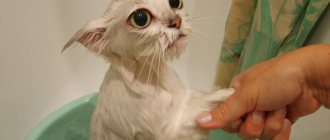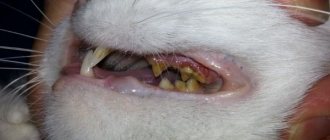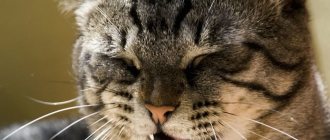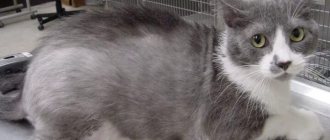Size doesn't matter
Did you know that cats do not perceive the height and size of living creatures with which they interact?
Reality TV for cats
They really don’t care what size the person they want to play with is. There are special individuals who are friends with a real bear and even a lion. Relatives after all.
But this is a completely fearless cat:
Causes of a cat's fear of water
Zoologists, interested in this issue, found that cats are absolutely not afraid of water. Animals are afraid of the consequences of contact with it. A number of main reasons why a cat avoids bathing:
- risk of hypothermia,
- possibility of overheating,
- increased odor upon contact with water,
- fear of attack,
- stress from the imposed bathing procedure.
Sometimes the reasons include the animal's fear of contracting bacteria or infections, as well as the fear of being deaf. However, these are more likely the reasons of the cat owners, rather than the animals themselves.
Risk of hypothermia
A cat's fur has a special structure, specific composition and smell. Between the skin and fur of the animal there is a kind of air layer that retains heat. After contact with water, the fur loses its heat-insulating functions and the pet begins to freeze and shiver even in a warm room. In addition, after bathing, the cat’s body temperature decreases by 5–7°, which is why the purr cannot warm up until it dries completely. Of course, at home, a cat is unlikely to run the risk of getting too cold, but at the genetic level, the instinct of self-preservation is triggered, and the pet diligently avoids water treatments.
Possibility of overheating
The air accumulated in a cat's fur can not only protect the animal from the cold, but also save it from overheating on a hot day. The air cushion prevents the sun's rays from heating the animal's delicate skin. The dog escapes the heat by sticking out its tongue and breathing frequently. Cats, alas, don’t know how to do this, so in order not to get their coats wet, they avoid bodies of water even in the heat.
Increased odor upon contact with water
Every cat has a hunter's instinct from birth. She, like a sniper, can wait for hours for a victim in a motionless state. The wet skin begins to intensely emit a specific odor because the body temperature begins to rise sharply. This “amber” can be smelled by potential prey, and the musky runs the risk of being left without lunch. In order not to remain hungry, the cat tries not to come into contact with water.
Fear of attack
A wet cat, spreading its scent, can itself become an object of attack by a stronger and larger predator. Sitting in ambush, the animal does not have the opportunity to lick itself thoroughly to eliminate the incriminating odor. In addition, wet fur becomes heavy and makes it difficult for the cat to quickly retreat in case of danger. It is clear that this does not threaten the pet, but no one has canceled the instinct of self-preservation.
Fear of bacteria and infection
Dry cat fur repels dirt and dust, which contain large amounts of bacteria and pathogens. The wet one, on the contrary, collects them. During licking, pathogenic microflora enter the stomach and can cause significant harm to the pet’s health. Some felinologists believe that a cat intuitively understands the consequences of water procedures for the body.
Fear of going deaf
Hearing, along with other senses, is of great importance for a cat. Water that gets into the ears while swimming can cause inflammation and even lead to complete deafness. It is very difficult for a deaf animal to adapt to the world of sounds, so the cat, anticipating another trouble, is careful of water.
Stress from the imposed bathing procedure
The cat is incredibly clean. She bathes herself several times a day. The pet considers bathing to be a pointless procedure that violates the cat’s comfort. The animal is sincerely perplexed why the owner put it in the hated chlorinated water and lathers it with an incomprehensible substance with a synthetic smell. In addition, the owner’s touch during bath procedures is not always delicate. The cat has no escape route and has to forcefully endure the imposed process.
It is clear why the purr has difficulty withstanding this “execution” and sometimes falls into a state of stress.
Video: why cats are afraid of water
Despite their dislike of the water element, cats are excellent swimmers. Why do they need this? The reason is simple - the same instinct of self-preservation. In extreme conditions, the pet has to swim, sometimes over quite long distances. The fluffy beauty's ability to swim has been developed since birth. Even one-month-old kittens that fall into the water swim like dogs, quickly moving their paws.
Loud and sharp sounds scare people too
Remember yourself when you flinch or cry out from a sudden noise behind you. Cats are no exception. Sharp sounds can send your pet flying out of the room like a bullet. All that can be seen are the flickering pink pads on the sides of the tucked tail.
Friend: “Are you okay?” Me:
This noise includes a vacuum cleaner, hair dryer and other loud equipment. Although there are such daredevils who even attack a working vacuum cleaner.
What are cats afraid of?
Every cat owner has encountered a situation when a pet suddenly gets scared of some object or a sharp sound, hiding in the farthest corner. All these fears, which seem unfounded, have a certain meaning that is understandable only to the tailed, and this must be treated with respect. Statistics most often show what cats are afraid of. Noise is the main irritant. Any sources of sharp and loud sounds, be it a thunderstorm, firecrackers, a drill, a vacuum cleaner or a hairdryer, can provoke panic in a cat. This is due to the animal’s very sensitive ears, which is why it perceives all sounds more acutely than humans. During an incomprehensible noise, the cat hides in a secluded corner and sits there until the “cannonade” ends. It is better not to touch the pet at this time, not to persuade it to leave. What are cats afraid of in the bathroom? Hydrophobia (fear of water) is inherent in the vast majority of cats. It's not so much the fear itself, but the unpleasant sensations that getting into the water causes in a cat. The structure of a cat's fur is radically different from that of a dog. Once wet, it loses the air layer, and the cat gets very cold. This is the main reason for the fear of moisture. Difficult relationships with others Most cats are wary of strangers and try to hide when guests arrive. It is better not to force her out to meet the guests, but to give her the opportunity to watch them from hiding. Often, unsociability is not a fear of strangers, but a specific character trait that must be come to terms with. Sometimes one of the family members who “dares” to play roughly with it or punish it becomes scary for the animal. Children are usually the object of dislike. To regain affection, it is important not to impose your affection on her, not to punish her and try to talk to her more often in a calm, friendly voice. Dislike for Aibolit What cats are afraid of in the hospital is clear to every owner. Unpleasant and often painful manipulations, unfamiliar hands into which the cat finds itself. All this can cause an extremely negative reaction, which can even lead to aggression. To minimize stress, the owner must remember the basic rules for handling a pet: – do not worry yourself, as negative emotions are transmitted to the cat and worsen its emotional state; – As far as possible, take on part of the procedures yourself. When a cat is held by familiar hands, it feels calmer; – talk kindly and calmly to the animal, encouraging it.
Big scary green cucumber
You may have seen a video where cats are terrified of a cucumber that suddenly appears behind their back. Such fears are rather a myth. The stars of these videos might as well be afraid of other objects. And the version that a cucumber may remind them of a snake is just assumptions and speculation.
Unsuspecting cat freaked out by cucumber from CucumbersScaringCats
How to help an animal overcome its fear of water
It is better to accustom a cat to water from early childhood. Kittens are more curious and playful than adults. Habituation should be gradual and unobtrusive. The first thing you need to do is let the kitten understand that water is not dangerous. Let him listen to the murmur of the stream and enter the bathroom without fear. The easiest way to make friends with water is through play. To do this you need:
- take 5–7 cm of water at a temperature of 37–39° into a bowl or small basin,
- place the container in a place where the kitten likes to be,
- Carefully, without splashing, throw objects into the basin that may interest the purr,
- wait until the pet touches them with his paw and starts playing,
- help the kitten wet its paws (if the animal is not afraid, you can put it in the water for a while),
- gradually increase the amount of water in the basin,
- When the kitten gets used to a basin of water, you can introduce it to the bath (all the same actions as with the basin).
If an animal categorically does not come into contact with water, you should not force it. The process of adaptation to bathing in an adult cat is much more complicated, since the animal has already formed its character and habits. Taking a bath is an unfamiliar and dangerous procedure for her. The pet may become overexcited and fall into a prolonged depression.
The main mistakes in teaching a cat to bathe are:
- violence - freedom-loving and proud cats cannot tolerate coercive methods,
- aggression - rudeness during bathing,
- impatience - sudden immersion and forcible holding of the cat in the water.
Video: how to persuade a cat to wash itself
An alternative to bathing for particularly fearful pets is to use dry shampoo. This product in the form of powder, mousse or spray cleanses the cat's fur no worse than liquid shampoo. It is simply rubbed into the fur coat with a soft cloth, and then thoroughly combed out with a fine-toothed comb. The disadvantage of this procedure is that some cats do not like combing their fur as much as bathing.
Love and hate
What about water? Thought we forgot that cats are afraid of water?
In fact, this judgment is also not entirely true. These fluffies love to stick their paws into different containers of water. And they are also excellent swimmers, and have been since childhood.
They don’t like bathing, especially with detergents, because they just immediately feel very cold. Water and soapy substances immediately wash away the thin layer of fat under the fur that protects them. After all, wet wool no longer warms.
Cats are afraid of dogs
It is generally accepted that the most common and beloved pets - cats and dogs - are two eternally warring armies. But not everyone knows the answer to the question why the former dislike the latter so much. In fact, everything is quite simple: these animals express their emotions in exactly the opposite way, which is why cats are afraid of dogs. For example, a dog, rejoicing, stands on its hind legs and barks loudly. The cat visually increases its height by arching its back and hisses when preparing to attack. A dog, expressing its friendliness, wags its tail, and a cat does this when it is irritated and nervous. So a dog who is in the mood for a pleasant acquaintance, rushing as fast as he can to the cat with a loud bark, is unlikely to meet with the mustachioed mutual understanding. As zoologists say, cats are more afraid of unnecessary relationships with strange creatures than they are of dogs themselves.











